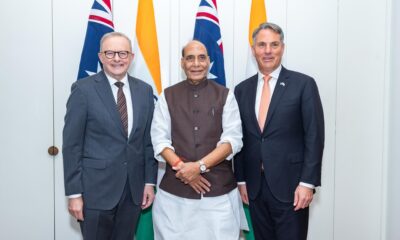Top Stories
Google Agrees to $36M Fine in Australia Over Antitrust Practices

Google has agreed to pay a fine of $35.8 million (A$55 million) in Australia after admitting to anticompetitive practices that restricted consumer choice regarding search engines on Android devices. The Australian Competition and Consumer Commission (ACCC) announced the penalty following a detailed investigation into Google’s agreements with telecommunications companies Telstra and Optus. These agreements, which spanned from December 2019 to March 2021, prohibited these carriers from offering competing search engines on Android phones, effectively limiting options for consumers.
The ACCC’s statement outlined how these arrangements required that all Android devices sold by Telstra and Optus come with Google Search pre-installed as the default option. In return, Google shared advertising revenue with the telecoms whenever customers utilized its search engine. Furthermore, the agreements included “Platform-wide Provisions,” which prevented the installation of other search engines, thereby creating significant barriers for competition in the market.
“Conduct that restricts competition is illegal in Australia because it usually means less choice, higher costs, or worse service for consumers,” said Gina Cass-Gottlieb, Chair of the ACCC. Google acknowledged that the deals likely had the effect of substantially lessening competition in Australia’s search market.
As part of the settlement, Google has committed to changing its business practices. The company will eliminate restrictions that forced device manufacturers and telecommunications providers to pre-install Google Search as the default. Additionally, Google has agreed to reevaluate its contractual arrangements with Android phone manufacturers and Australian telcos dating back to 2017.
While Google does not fully agree with all of the ACCC’s concerns, it has acknowledged them and committed to making the necessary changes. Similar commitments have also been made by Telstra, Optus, and TPG, who stated they would no longer enter into arrangements requiring exclusive pre-installation of Google Search.
The ACCC highlighted that these changes will provide millions of Australians with increased search options, allowing telecoms to configure search services on individual devices and to establish agreements with other search providers. This shift comes at a time when artificial intelligence (AI) search tools are beginning to alter how people access information online, further increasing competition in the sector.
The case against Google is part of a wider global scrutiny of its market dominance. Earlier in August 2024, a U.S. judge ruled that Google had illegally monopolized the search market, noting that the company held an 89.2% share of general search services, a figure that rises to 94.9% in the mobile segment. In response, U.S. prosecutors are pursuing measures that could force Google to divest its Chrome browser.
In Europe, Google has faced fines exceeding €8 billion since 2017 for various antitrust violations, with the European Commission indicating in March 2025 that Google is not compliant with regulations established under the Digital Markets Act. Additional antitrust cases are also underway in Canada regarding Google’s practices in online advertising.
The enforcement action in Australia stems from a comprehensive five-year inquiry by the ACCC into the impact of digital platforms on competition and consumers. The commission’s findings revealed significant concerns regarding Google’s contractual practices, leading to this settlement aimed at promoting a more competitive environment.
While the court must still approve the $35.8 million penalty, Google’s new business commitments will take effect immediately upon judicial endorsement. The ACCC remains focused on tackling anti-competitive conduct, emphasizing that fostering competition is vital for economic dynamism. The final ruling is anticipated in the coming months, marking a significant moment in the ongoing dialogue surrounding digital competition and consumer rights.
-

 Sports1 month ago
Sports1 month agoNetball New Zealand Stands Down Dame Noeline Taurua for Series
-

 Entertainment1 month ago
Entertainment1 month agoTributes Pour In for Lachlan Rofe, Reality Star, Dead at 47
-

 Entertainment1 week ago
Entertainment1 week agoNew ‘Maverick’ Chaser Joins Beat the Chasers Season Finale
-

 Sports1 month ago
Sports1 month agoSilver Ferns Legend Laura Langman Criticizes Team’s Attitude
-

 Entertainment2 months ago
Entertainment2 months agoKhloe Kardashian Embraces Innovative Stem Cell Therapy in Mexico
-

 Sports2 months ago
Sports2 months agoGaël Monfils Set to Defend ASB Classic Title in January 2026
-

 World3 months ago
World3 months agoPolice Arrest Multiple Individuals During Funeral for Zain Taikato-Fox
-

 Politics2 weeks ago
Politics2 weeks agoNetball NZ Calls for Respect Amid Dame Taurua’s Standoff
-

 Entertainment3 weeks ago
Entertainment3 weeks agoTyson Fury’s Daughter Venezuela Gets Engaged at Birthday Bash
-

 Sports3 weeks ago
Sports3 weeks agoHeather McMahan Steps Down as Ryder Cup Host After Controversy
-

 Entertainment3 weeks ago
Entertainment3 weeks agoTyson Fury’s Daughter Venezuela Gets Engaged at Birthday Bash
-

 World3 weeks ago
World3 weeks agoNew Zealand Firefighters Plan Strike on October 17 Over Pay Disputes





















